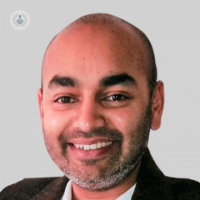Demystifying anxiety: A comprehensive guide
Autore:In his latest online article, Dr Iqbal Mohiuddin gives us his insights into anxiety. He talks about what anxiety is, the symptoms, diagnosis, the different types of anxiety disorders, treatment options and prevention.

What is anxiety?
Anxiety is a normal and often healthy emotion, but it can become a disorder when it is excessive, persistent, and interferes with your activities of daily life. It is a natural survival response to stress or danger, characterised by feelings of worry, nervousness, or unease. It can vary in intensity and duration and can affect both physical and mental well-being.
What are the symptoms of anxiety?
Symptoms of anxiety can include feelings of fear, excessive worrying, restlessness, fatigue, difficulty concentrating, irritability, muscle tension, and sleep and eating disturbances. More physical symptoms may also manifest, such as rapid heartbeat, palpitations, sweating, trembling, shortness of breath, and nausea.
How is anxiety diagnosed?
Anxiety is typically diagnosed through a combination of physical examinations, psychological evaluations, and discussions about symptoms and medical history. A healthcare professional such as a psychiatrist may also use diagnostic criteria outlined in the International Classification of Diseases (ICD-11) to make a diagnosis.
What are the different types of anxiety disorders?
Many different types of anxiety disorders can cause significant distress. These include generalised anxiety disorder (GAD), panic disorder, social phobia or social anxiety disorder, agoraphobia, obsessive compulsive disorder (OCD), and post-traumatic stress disorder (PTSD).
What are the treatment options for anxiety?
Treatment options for anxiety can include a combination of therapy, medication, and self-care strategies. Here are some common treatment options:
Therapy: Cognitive behavioural therapy (CBT) is often used to help individuals identify and change negative thought patterns and behaviours that contribute to anxiety. Other types of therapy, such as exposure therapy, mindfulness-based therapy, and Human Givens Therapy may also be beneficial.
Medication: Antidepressants, anti-anxiety medications, and beta-blockers are commonly prescribed to help manage anxiety symptoms. These medications should be prescribed by a healthcare professional such as a psychiatrist and used under their supervision.
Self-care strategies: Lifestyle changes, stress management techniques, regular exercise, adequate sleep, and relaxation exercises such as 7:11 diaphragmatic breathing (deep breathing) or meditation can help reduce anxiety symptoms.
Support groups: Joining a support group or seeking support from friends and family members can provide emotional support and a sense of community.
Lifestyle changes: Avoiding alcohol, caffeine, and recreational drugs, as well as maintaining a healthy balanced diet and regular exercise, can help manage anxiety symptoms.
It is important to work with a healthcare professional such as a psychiatrist to determine the most appropriate treatment plan for your individual needs and recovery.
Can anxiety be prevented?
While anxiety cannot always be prevented, certain strategies such as stress management, healthy lifestyle choices, regular exercise, adequate sleep, avoiding alcohol and drugs, and seeking support when needed can help reduce the risk of developing anxiety.
Dr Iqbal Mohiuddin is an esteemed consultant psychiatrist with over 25 years of experience. You can schedule an appointment with Dr Mohiuddin on his Top Doctors profile.


